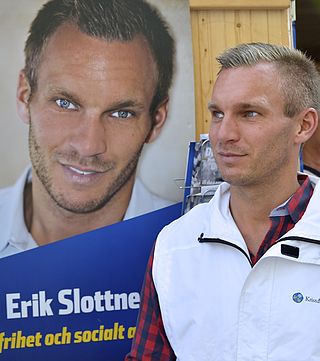The Ministry for Rural Affairs, known between 1900 and 2010 as the Ministry of Agriculture, was a ministry within the government of Sweden. The ministry was responsible for matters relating to rural areas, food and land- and water-based industries, regional development, transport and infrastructure, housing, and community planning. The ministry was headed by the minister for rural affairs (2011–2014) and the minister of agriculture (1900–2010). The ministry was disbanded on 31 December 2014, and from 1 January 2015, the matters was handled by the Ministry of Enterprise and Innovation.
The Consulate General of Sweden is the diplomatic mission of Sweden in New York City. It is located at One Dag Hammarskjöld Plaza in Turtle Bay, Manhattan, near the headquarters of the United Nations. The consulate general originated from the consulate opened in 1834, which was converted into an consulate general in 1914. The consulate general's district includes the states of Connecticut, Maine, Massachusetts, New Hampshire, New Jersey, New York, Pennsylvania, Rhode Island, and Vermont. The consulate general offers various consular services like passport applications, citizenship matters, and name registration, alongside providing assistance to Swedes in emergencies. It also works on fostering cultural and economic ties, organizing events to promote Swedish culture in the northeastern United States. Additionally, it facilitates information sharing about Sweden, and promotes exchanges between Swedish and American organizations.
The Ministry of the Interior was a ministry in Sweden established in 1947. The department dealt with matters concerning general health and medical care, the police service, the fire service, and the local government. The ministry was headed by the minister of the interior. At the end of 1973, the Ministry of the Interior ceased to exist and the activities were taken over by other ministries, such as the Ministry of Employment and the Ministry of Housing. In 1996, the former Ministry for Civil Service Affairs changed its name to the Ministry of the Interior and was called that until 1998, when the ministry ceased.
The Ministry for Civil Service Affairs was a ministry in Sweden, established through the 1840 ministerial reform. The ministry and its most important areas of responsibility were agriculture, bergsrörelse, trade, shipping, factories, crafts and other industries, public roads and other communications. The ministry was headed by the minister for civil service affairs. In 1920, the Ministry for Civil Service Affairs was replaced by two ministries: the Ministry of Social Affairs and the Ministry of Communications (Transport). The Ministry for Civil Service Affairs was re-established in 1950 and then handled the wage and pension system until 1969 when it became the Ministry of Local Government. In 1983, the Ministry for Civil Service Affairs was re-established and operated until 1996, when the Ministry for Civil Service Affairs was transformed into the Ministry of Internal Affairs which was disestablished two years later.

The Minister for Civil Service Affairs, since 2010 called Minister for Public Administration, is a member of the Government of Sweden. The minister for civil service affairs was the head of the Ministry for Civil Service Affairs from 1840 to 1996. It was reintroduced as a minister without portfolio post in 2010. Its tasks includes government procurement and an overall responsibility for municipalities and regions.
The Ministry of Commerce and Industry was a ministry in Sweden, established in 1920 when certain matters were taken over from the Ministry of Finance. The ministry was headed by the minister of commerce and industry. The ministry ceased to exist in 1982 and matters were transferred to the Ministry for Foreign Affairs.

The Minister of Supply was a member of the government of Sweden. The minister of supply was the head of the Ministry of Supply from 1939 to 1950 which handled matters relating to the national economy.
The Ministry of Supply was a ministry in Sweden established in 1939. The ministry was established in order to provide a better overview of the crisis measures that the Second World War caused. The ministry dealt with administrative matters relating to general guidelines for government activities to ensure the supply within Sweden of necessities that were important to the population or production. The ministry was headed by the minister of supply. The ministry ceased to exist in 1950.
The Ministry of Economics was a ministry in Sweden established in 1976. The ministry dealt with long-term guidelines for economic policy, the principle orientation of financial and credit policy, international economic cooperation, statistics, questions regarding banking and insurance, the stock exchange and the monetary system. The ministry was headed by the minister of economics. The ministry ceased to exist in 1982.
The Ministry of Housing [and Local Government] was a ministry in Sweden established in 1974. The department dealt with matters concerning housing policy: housing supplement for families with children, the housing system, rent regulation and planning and building issues including physical national planning. The ministry was headed by the minister of housing [and local government]. The ministry ceased after the 1991 Swedish general election.
The Ministry of Education and Ecclesiastical Affairs was a ministry in Sweden established in 1840. The ministry dealt with matters concerning the church, education, science, culture, medical and general health care as well as poorhouses. The ministry was headed by the minister of education and ecclesiastical affairs. The ministry changed its name on 31 December 1967 to the Ministry of Education and Cultural Affairs.
The Ministry of the Budget was a ministry in Sweden established in 1976. The ministry was primarily responsible for budget regulation as well as the general administration and accounting of state funds, the state and municipal tax system. The ministry was headed by the minister for the budget. The ministry ceased to exist in 1982.
The Consulate General of Sweden, Los Angeles was the diplomatic mission of Sweden in Los Angeles between 1980 and 1995, as well as between 1998 and 2009. The consulate general had its origins in the honorary vice consulate opened in 1910, which was transformed into an honorary consulate in 1955 and an honorary consulate general in 1969. The main tasks of the consulate general were to disseminate information about Sweden and Swedish collaboration opportunities, promote business activities through various events, and handle consular matters and assistance to Swedish citizens in the western United States.
The Consulate General of Sweden, Minneapolis was the diplomatic mission of Sweden in Minneapolis between 1963 and 1989. The consulate originated from the honorary vice consulate opened in 1908, which was converted into a consulate in 1934 and into a consulate general in 1963. Along with those in New York City, San Francisco, Montreal, Chicago, and Houston, the consulate belonged to the so-called "heritage consulates" due to the large number of inheritance cases it handled.





